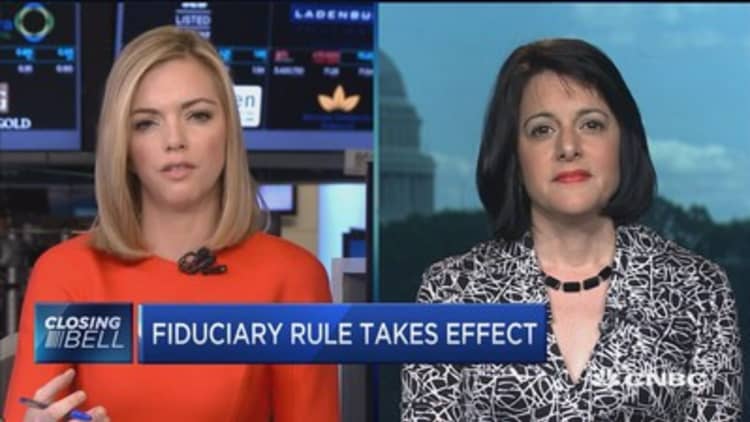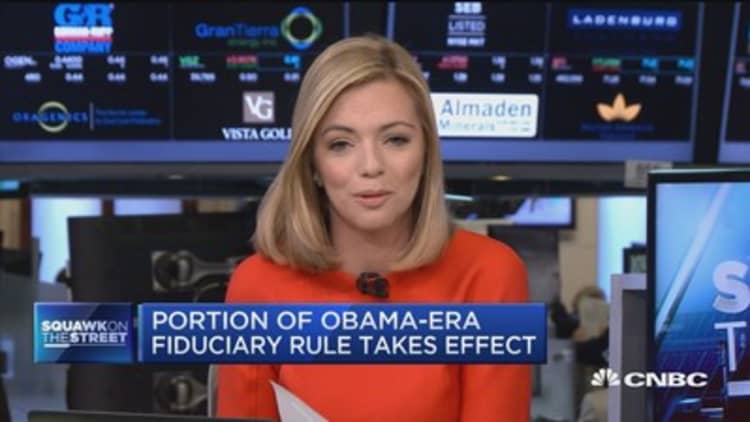A regulation that aims to protect your retirement savings from bad brokers may be on its last legs.
A portion of the Labor Department's "fiduciary rule," which requires financial advisors to act in your best interest when giving advice on your 401(k) and individual retirement accounts, was supposed to take effect on Jan. 1. The Labor Department oversees regulation of retirement plans.
It has since been delayed to July 1, 2019.
The provisions that have been postponed include one that would allow advisors to continue earning commissions, provided they enter a contractual agreement that they will act in the client's best interest.
Though other parts of the rule took effect on June 9, 2017, consumer advocates fear that the postponement is a sign that the rule is slowly being defanged.
"'Delay' implies that it will take effect," said Barbara Roper, director of investor protection at the Consumer Federation of America.
"The department has made clear that they will significantly revise the rule, including by eliminating provisions that make it effective and enforceable," she said.
Here is where the rule now stands.
Partial protection
For now, some portions of the investor protection rule are in place.
These include the "impartial conduct standard," which requires advisors to charge no more than reasonable compensation, avoid misleading statements and provide advice in the investor's best interest.

In anticipation of the rule, large brokerage firms sought to do away with commissions for their 401(k) businesses, allowing advisors to charge a flat fee and mitigating conflicts of interest.
"We are almost in a post-fiduciary phase," said Marcia Wagner, managing director of The Wagner Law Group. "Most firms acknowledge you're in a fiduciary capacity with retirement accounts."
The rule covers retirement assets only
Bear in mind that these requirements apply to retirement assets only. Your brokerage account isn't subject to the same protections.
The Labor Department has said it would apply a temporary enforcement policy until July 1, 2019, under which it will not pursue claims against those who are working in good faith to follow the regulation.
For now, this means the protection investors get is only partial.
"It really means that pretty much anyone paid to give advice to retirement investors is a fiduciary, but the enforcement mechanisms are pushed back," said Skip Schweiss, president of TD Ameritrade Trust Company.
Turf war coming?
At the same time, other regulators are working on their own consumer protection rules, hinting at a turf war among agencies.
The Securities and Exchange Commission hasn't released a fiduciary rule of its own yet, but the agency has pushed back against the Labor Department's regulation, arguing that it would complicate compliance procedures for advisors and their firms.

"Under the fiduciary rule, a broker-dealer performing the same type of service for a single client's retirement and non-retirement securities accounts would be subject to separate obligations based on the regulatory status of each account," SEC Commissioner Michael Piwowar wrote in a July 25 letter to the Labor Department.
Meanwhile, the National Association of Insurance Commissioners, a group of state insurance regulators, is working on a "best interest standard" for annuity sales.
Since insurance is regulated by the states, a standard proposed by the NAIC may be interpreted differently from one jurisdiction to the next.
"It would be hard to transact business with 50 different fiduciary standards," said Wagner.
Protect yourself
Regardless of which rules wind up in place, you are your own first line of defense.
Here are a few suggestions to help you vet your financial advisor.


